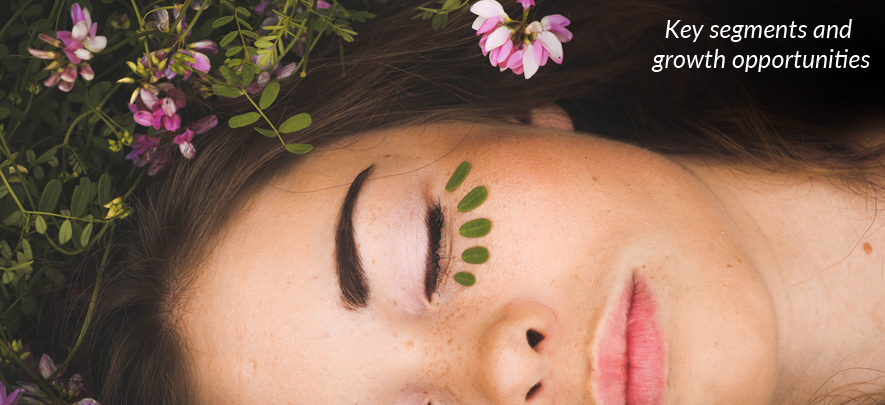Beauty and wellness industry: Key segments and growth opportunities

Health & Lifestyle
293 week ago — 10 min read
Along with an ever evolving business landscape in India, its consumers too have metamorphosised. Industrial trends are changing and increasing consumer awareness and acceptance of beauty and wellness as an integral part of our lives has brought this industry to the forefront. The beauty and the wellness industry has gained tremendous momentum in the past few years and is well on the road to becoming one of the largest industries contributing to the growth of our economy.
The following are experts from the report titled Wellness and beauty- An ecosystem in the making by Federation of Indian Chambers of Commerce and Industry (FICCI) in collaboration with Ernst & Young (EY).
This article covers the key segments of the wellness and beauty industry and the global market size the industry covers. In addition to that, the growth opportunities in each of the segments give an interesting insight into the future of this yet developing market. Read on…
Impacting other peripheral industries
Wellness and beauty industry has experienced an impressive growth story in recent years owing to the young demography, incremental disposable income and an overall shift of conscience towards a healthier lifestyle. The entry of bigger players is propelling this highly unorganized industry towards formalization. It is also making consumers more confident to incorporate wellness products and services into their changing lifestyles.
The growth is not just restricted to the core segments of wellness and beauty, but is spilling over to various peripheral industries like insurance, apparel and footwear, tourism, fast moving consumer goods (FMCG), hospitality and pharma. Consequently, these industries are evaluating opportunities to collaborate and invest in the wellness and beauty industry.
Established FMCG players are introducing new product lines like herbal, ayurvedic, organic, etc. with a focus on the overall wellness. Fitness apparel companies are partnering with gyms to offer signature workout and meal plans. Health insurance plans are including wellness coaches to provide guidance on fitness regime, nutrition, lifestyle changes and the like. Hotels are allying with spas to offer complementary services. The traditional industry boundaries are increasingly getting blurred with cross selling and portfolio expansion. Salons are expanding into fitness through gyms and entering hospitality sector by opening spas in luxury hotels.
Key segments of wellness industry
The National Accreditation Board for Hospital & Healthcare providers (NABH) defines wellness as, “A state of healthy balance of the mind and body that results in the overall well-being”
It is a holistic integration of seven dimensions - physical, emotional, intellectual, social, spiritual, environmental and occupational well being of an individual. However, from consumer products and retail perspective, physical wellness has always been the most salient aspect, which focuses on external appearance and corporal health. From an industry standpoint, it can be grouped into the following three key segments –
- Nutraceuticals
- Alternative therapies and
- Fitness and slimming.
Nutraceuticals
Nutraceuticals can be simply defined as functional products which provide additional health benefits. They can be classified into three sub-categories - functional food, functional beverages and health supplements.
Alternative therapies
Alternative therapies are the healing methodologies which differ from the usual line or conventional medical practice (Allopathy). In November 2014, Indian government established the Ministry of AYUSH (Ayurveda, Yoga and Naturopathy, Unani, Siddha, Sowa-Rigpa and Homoeopathy) to ensure optimal development and propagation of these alternative health care systems.
Fitness and slimming
Fitness has always been an integral part of the Indian culture, as evidenced by the existence of village akhadas, yoga and Ayurveda practices in the country. However, with changing lifestyles and increased western influence, the pursuit of fitness has also become modern.
Also read: A new breed of wellpreneurs reimagine age-old wisdom for contemporary times
Key segments of beauty industry
The beauty industry in India can be defined as a gamut of all those services and products which focus on enhancing the aesthetics or appeal of an individual to make him/her look and smell better. Salons, spas (rejuvenation) and aesthetic dermatology are three key segments of the beauty services industry.
Market size of the beauty and wellness industry in India
Some interesting surveys reveal the following data in terms of market size:
- India was ranked as the 2nd most affordable beauty market globally in the year 2017
- It is the sixth amongst the top 10 countries by non-surgical procedures carried out in 2016
- Seventh amongst top 10 countries as per the total cosmetic procedure carried out in 2016
- India was among the top 20 spa markets globally in 2015, with 4,734 spas employing 55,862 people.
- As per the total number of surgical procedures carried out in 2016, India ranked fifth amongst the top 10 countries
- In terms of surgical procedures, India was ranked 5th with total face and head procedures
Let us take a deeper look in to each of the segments of the beauty and wellness industry to understand their growth opportunities.
Also read: Your health is important
Growth Opportunities
1. Nutraceuticals
The nutraceuticals sector was estimated at US$4b in 2017. It is predicted to grow at a CAGR of 20.2% and reach US$10.01b by 2022. Health supplements occupy the majority share (~63%) within the nutraceuticals market. It is expected to grow at a rate of 18.7% to reach US$5.9b by 2022, up from US$2.5b in 2017.
The functional food and beverage segment is still in its infancy stage in India, catering mostly to the urban population. The functional food and beverage segment was valued at US$1.5b in 2017 and is anticipated to reach US$4.1b by 2022, growing at a CAGR of 22.3%.
2. Alternate therapies
The AYUSH industry is estimated to have an annual turnover of around US$1.7b1. The products market is worth US$0.6b with over-the-counter products such as digestives, health food and pain balms constituting almost 75% of the segment. This offers a promising opportunity in the manufacturing of AYUSH prescribed drugs.
As per the total number of surgical procedures carried out in 2016, India ranked fifth amongst the top 10 countries
3. Fitness and slimming
The overall fitness market was estimated around US$14b2 in 2017. The growth in this industry is primarily driven by the increasing focus on personal health and wellbeing. With a shift in urban lifestyle towards sedentary, there is a renewed focus on fitness to avoid lifestyle-related diseases and deal with stress. Seeking professional guidance for fitness and slimming are no longer considered a luxury, but an elementary part of a healthy lifestyle.
4. Salon industry
The salon industry in India was estimated to be around US$3.8b3 in 2017—18, growing at a CAGR of 27%—30% in past two years. It is roughly 30% of the overall wellness and beauty market. Grooming and beauty services have become a part of one’s lifestyle leading to a growing demand of experiential services. For example, between 2014 and 2018, the average number of services availed by a customer has increased from 1.8 to 5 at the India outlets of Truefitt & Hill, a premium international male grooming chain.
5. Spa market
The spa industry in India is in a nascent stage but growing rapidly due to increasing wellness tourism, improving living standards and growing awareness about the importance of maintaining physical and mental health. Currently, India is the third fastest growing spa market after America and Europe. According to the Spa Association of India, spa industry in India was valued at US$1.7b in 2017.
6. Aesthetic dermatology
The aesthetic dermatology industry is growing rapidly in India, driven by positive macroeconomic factors, rising aspirations to achieve perfect body and face, increased medical tourism, availability of quality services and improved healthcare infrastructure. In 2017, the Indian cosmetic treatment market (comprising of skin care and hair care treatments) was valued at around US$0.5b4. Of this, skin care occupied the maximum share (60%).
The wellness and the beauty market is truly an ecosystem in the making. And it is just the beginning. Over the course of next three articles, I will reveal the industry structure of the beauty and wellness industry, its key drivers, the key trends governing this industry, employment opportunities and the key challenges this industry faces. Stay tuned!
Also read: Healthcare and life sciences outlook 2019: Is the heat still on?
Source: Wellness and beauty- An ecosystem in the making by Federation of Indian Chambers of Commerce and Industry (FICCI) in collaboration with EY
Image courtesy: unsplash.com
Posted by
GlobalLinker StaffWe are a team of experienced industry professionals committed to sharing our knowledge and skills with small & medium enterprises.
View GlobalLinker 's profile
Most read this week
Trending
Ecommerce 4 days ago













Comments
Share this content
Please login or Register to join the discussion